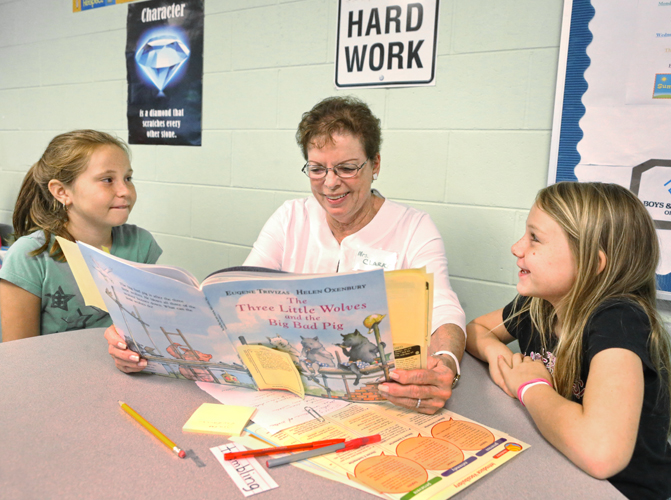
School may be out, but the young minds of children enrolled in the Vero Beach, Sebastian and Fellsmere Boys and Girls Clubs’ Summer Program are kept engaged with a curriculum that emphasizes summer literacy through a program called Summer Brain Gain: Read!
“Our goal is to help prevent the ‘summer slide’,” says Angela Astrup, B&GC director of development and marketing. “When kids go back to class after their summer break, most kids lose about two months’ worth of math skills. Low-income youth also lose more than two months of reading skills.”
Thanks to generous contributions from supporters at the annual Angels Help Our Kids Take Flight dinner, more than 60 percent of the 600 children enrolled in the Summer Program received full or partial scholarships to attend.
The nationwide Summer Brain Gain: Read program was developed this year by Boys and Girls Clubs of America to enhance and reinforce literacy skills. BGCA chose the titles of the 30 books and developed interesting projects to go along with them. Ten books were chosen for children in each of three levels – kindergarten to second grade, third to fifth grades and sixth to eighth grades.
“The academic success of our club members is of the greatest importance to us at the Boys and Girls Club. The Summer Brain Gain: Read program is just one component of ensuring our youth are on track in school, with a plan for the future,” explained Elizabeth Thomason, executive director.
“Summer learning losses can stack up from year to year, causing low-income children to fall further and further behind, ultimately endangering their chances of high school graduation. We are committed to ensuring that our members graduate from high school, on time, with a plan for the future. The summer program is just one tool in the toolbox to help ensure our members’ success,” added Thomason.
Astrup explains that while educators suggest elementary school students should read at least 15 to 20 minutes a day, many children don’t even have books at home so the only time they read is at the clubs.
“Nearly all of our parents are working parents so it’s also the time factor. We’re open all day from 7:30 in the morning until 6:30 at night, and some of our kids are there that whole time.”
In addition to weekly reading sessions, she said various activities help bring the books to life, and gave as an example one of the younger group’s books, “10 Things I Can Do to Help My World.”
“It’s about small things they can do in their everyday life to make a difference in the world, like recycling,” explains Astrup. “They do some really cute things with that book.”
To promote recycling, children are turning rolls from toilet paper and paper towels into games, are making bird feeders out of recycled materials, and are putting pieces of garbage into mason jars of soil to see how it breaks down over the course of time.
Astrup said they are also encouraged to “drop everything and read” at certain points throughout the day.
Another way of captivating their attention was by introducing them to a most unusual “author.”
“She whispers in my ear and tells me what to write,” said Leslie Balcerak of Aggie, a former racing greyhound and the “co-author” of the book, The 45 mph Couch Potato.
“That’s impossible!” exclaimed one little boy.
He was quickly rebuked by a little girl who said with confidence, “She’s a dog whisperer.”
As with the book, written from the dog’s perspective about life lessons learned, Balcerak turned the visit into an engaging teaching experience, speaking about the history of greyhounds and their unique characteristics.
“She’s very quiet and she doesn’t smell very much, except for her breath. She didn’t have dental care when she was young,” said Balcerak, adding the admonition, “See what can happen when you don’t brush your teeth?”
The clubs are also working closely with volunteers from The Learning Alliance this summer, who are providing tutoring to children needing extra help.
“Knowing how to read, and read well, is critical to the long-term success of our youth,” Astrup reiterated. “Our hope is that these programs and collaborations will not only increase their reading abilities, but will also instill in them a lifelong love of learning.”



